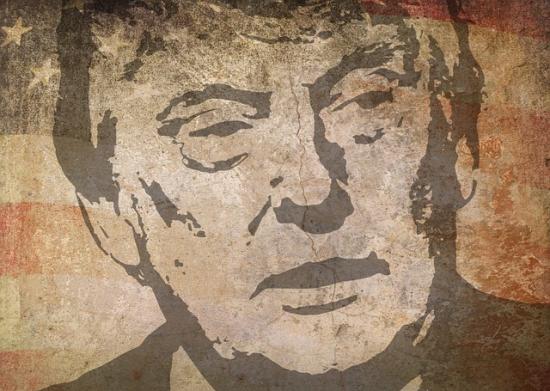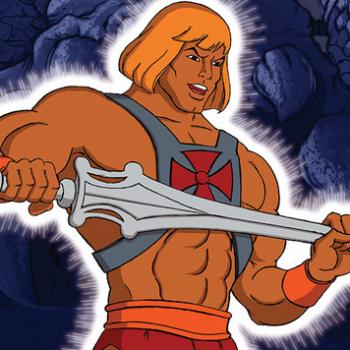
I am not a fan of President Donald Trump. I was annoyed when he was just another blowhard trying to stay in the news by playing politics. I was worried when he became a viable candidate. I’m deeply troubled by him as president.
I’m obviously not alone. Every week, there’s a new scandal. He possibly colluded with Russia. He paid a porn star to keep an affair quiet. His administration is ripping children from their parents’ arms at the border. Any of these would be a career-ender in another presidency. They happen with such frequency under Trump’s leadership that every atrocity is quickly replaced by the next. It’s a stressful, disconcerting time to be an American, particularly when I reflect on how many seemingly moral, nice people support him.
It’s tempting — and, let’s be honest, cathartic — to deride him in the most exaggerated and pointed terms. And, I’ll be honest, I have. Twitter and Facebook are great release valves (to be clear, they’re also horrible release valves), and I’ve often let loose with a snide comment or insult to the president. It’s easy to use the most exaggerated terms to describe him. Inhuman. Soulless. Monster.
But I’m rethinking that means of criticism. I don’t think describing him as an inhuman monster is helpful. In fact, I think it’s harmful in the long run. And here’s why:
Dehumanization stoops to his level
Last week, Robert De Niro made headlines and gained applause for saying “F*** Trump” during the broadcast of the Tony Awards. The actor’s words were definitely cathartic — and, let’s be honest, things we’ve probably muttered in private before — but I was troubled by the applause. It’s not that De Niro doesn’t have the right to say that or that I think Trump — who has said much worse — would be offended. Rather, what troubled me is that De Niro’s tactics were the same as the man he was decrying.
Before he became president, Donald Trump was known for two things: 1.) His money and 2.) His brash personality. He made a career out of bullying and belittling others, particularly those he didn’t like. He waged war on Rosie O’ Donnell, calling her a “fat pig” and “disgusting.” He’s referred to immigrants as “animals.” He’s wished violence on reporters. He does it because his supporters, blinded to nuance and running on emotion, lap it up. He feeds off their anger and disgust. Was what De Niro did any different?
During the election, Hillary Clinton famously said of her opposition, “When they go low, we go high.” I don’t know how well she stuck to that — and let’s defuse things right now by admitting that she was not a perfect candidate — but it’s a good rule of thumb. On social media, everyone knows that the moment you engage bile with bile is the moment you lose, even if you’re right. And the truth is that if you fight your enemy using the very tactics you hate, you’ll eventually turn into what you’re fighting.
Donald Trump is not the biggest problem in America. He’s simply a symptom of it, exploiting the rage that fuels bloggers, pundits and a frustrated electorate. To use his tactics and dehumanize those opposed to us is to feed the fire. No, you might not change anyone’s mind or walk away with a pithy bon mot, but to be patient, compassionate and loving to the people you engage with will speak louder than spreading their poison.
Dehumanizing him removes culpability
To call Donald Trump a monster is to remove responsibility for his actions. We turn him into the werewolf that can’t help itself from attacking, a zombie that knows nothing better than to be be bad. But turning him into a cartoon removes culpability.
This is a lesson that “Saturday Night Live” has not learned. At first, I was amused by the show’s use of Alec Baldwin as a doddering POTUS who was manipulated by Steve Bannon and bumbling through the White House. But quickly, that approach lost its appeal. Turning him into a buffoon dismissed the very real and very human pettiness, calculation and greed that underscore so many of his policies. He’s not a buffoon just screwing things up; he has an agenda centered on self that disregards anyone who might suffer because of it.
The same things happens when we turn him into a monster. I don’t believe he’s a soulless person who enjoys seeing children ripped from their parents’ arms; I do think he’s a person so disconnected from everyday life and insulated by wealth that he can look at others as pawns. I don’t think he’s setting out to destroy the world; I think he’s so focused on greed and “winning” that he will do whatever it takes to keep his supporters and look like a big man. That’s why he causes strife with our allies; collaboration requires humility. Deal-winning, on the other hand, just requires an outsized personality. To paint him as a monster removes nuance from his behavior. He’s just doing what he does. But to see the human, base impulses that guide him is to see a human whose decisions are thought-out and calculated. It doesn’t lessen his offenses; it increases his responsibility.
Dehumanization removes relatability
The reason we use terms like “monster” and “soulless” to describe people like Donald Trump is simple. Yes, it describes many of his actions. But more than that, it puts him on a different level from us. It says that what he’s doing is so horrible that he is not relatable as a human being any longer.
I understand our desire for phrasing things that way, but it’s dangerous. As I said before, keeping his humanity in mind holds him accountable. But more than that, it’s essential to understanding that everyone has the potential for the same actions. We’re all susceptible to these base, sinful impulses.
The thing that was most disturbing about Donald Trump’s election wasn’t Trump. He’s always been presented as a larger-than-life bully; it’s his brand. The disturbing thing was seeing how many people I considered moral, loving and compassionate individuals shared his view. People who taught me the ways of the faith, family members who showed me how to love with compassion, were suddenly saying things I would consider racist, hateful and greedy. Were they all monsters? Were they just happy to watch the world burn?
No. Just like Trump, they were fueled by a compass that was badly tuned. They were afraid of losing jobs, security or political position, so they created common enemies. They wanted someone who was going to make things better for them, even if it meant things would turn out worse for someone else. They were frustrated with being under-employed, over-taxed and losing their majority position in the world, so they lined up behind someone who was going to stop that from happening. They are not monsters; they are human.
We must remember that for many reasons. One is because we cannot afford to view our neighbors as monsters. There is no dialogue or healing possible if we lose sight of the Imago Dei in others. The other reason is because we must remember that every action we perceive as monstrous is possible in anyone. Our anger and fear can be stoked by small, rational concerns, and it’s possible that any of us could rally behind Trump-like figures.
We see that in how easily people on the Left can also be lathered into a frenzy. De Niro uses language that calls to mind Trump. People lash out at those who disagree with their views on abortion or same-sex marriage without thinking that there are complex, nuance beliefs that might inform them. We’re just as susceptible to fall for a celebrity who promises change; you can see that in the way many on the Left quickly toss out names like Oprah or Alec Baldwin for the next president.
This presidency, if anything, causes us to rethink what it means to be human, loving and compassionate, and to realize that behind our political rhetoric and actions are very real choices, flaws and biases.
Dehumanization is unbiblical
I don’t like Donald Trump. I wish he wasn’t president. I don’t want to think of anything good happening to him.
But here’s the thing: I have to pray for him. I have to respect the office of the president. When it doesn’t violate my conscience or hurt others, I have to submit to him as a leader God has placed in our nation at this time. I have to do that because I’m a Christian and this is what the Bible calls for.
Does that mean I can’t call for change or voice my criticisms? Does it mean that I can’t protest, petition and vote? No at all. The same God who ordained that Trump be president for whatever time he serves is the same God who allows us to live in a democracy where we have a voice. So I am within my right to call for change. I am not within my right to dehumanize or belittle another human being.
It seems like such a little thing, especially in a day when those claiming the name of Christ are so radically screwing up. But that’s why it’s so important for followers of Christ who are opposed to this administration’s actions to show respect and love, and pray for their political enemies. If we are calling for true Christianity, we have to be doubling down on what that looks like. It looks like loving our neighbor, speaking truth confidently but gently, and praying for those in power — even if that prayer might be that God change their hearts.
What will have more impact, and what has the potential to change hearts and minds: Another angry rabble ridiculing and deriding others or people who are firm in their convictions, unwilling to compromise in their beliefs, and doing so in a spirit of radical love? If we believe this Gospel has the power to change the world, we need to put it to the test. And that means all of it — loving others even as we fight for truth. We cannot get lax just because the most public Christians look so bad; we have to be more humble and intentional on how we walk than ever.
Dehumanization ignores the possibility for redemption
One final point on this. If we call Donald Trump or his supporters monsters, we are saying there’s only one way this story ends for them. In the movies, monsters exist for one reason: To be killed.
That is not a Gospel-centric, life-celebrating approach. We are people who believe in redemption. We are people who believe even the most vile life can turn around, and that even the most seemingly irredeemable person can be made right.
I’ll be honest: There’s a big part of me that doesn’t like this. I don’t like to think of Donald Trump becoming a (true) convert, reversing his policies and turning into a loving man. I want him impeached. I want him imprisoned. I want him relegated to a shameful place in American history. I am like Jonah, pouting at the idea of Nineveh coming to repentance.
But as a believer in the Gospel, as someone who believes God can make all things — and all people — good, I have to keep that possibility alive. My prayers for this nation must be laced for petitions for its leaders to be knocked flat by the beauty of God, turn to Him and glorify Him. If I pray for Donald Trump (and remember, I’m commanded to), that prayer must also be for his salvation and for God to use him for good.
Does that mean he should be free of consequences? No; if he has broken the law or done something worthy of impeachment, he should have to face the music. Does that mean I accept any vague statement about him claiming Christ as his savior? No; true conversion is followed by repentance and fruit. But it means I should be open to that possibility. Nothing is beyond God.
We are a hurting nation. Our hearts are curdling, our morale diving. We need the hope of the Gospel again. And that hope is that even the worst of us, even those who we call monsters, can be redeemed. It might be a far-off hope, but I will cling to it and try to remember it all the same. And I can’t do that if I don’t see a human, I see a monster.













